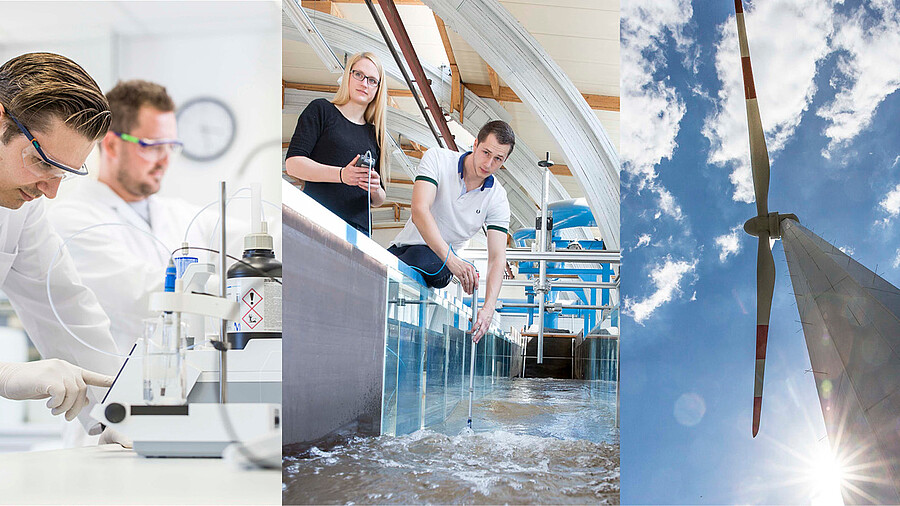Environmental Engineering
(Master of Science)
Profile
is optional.
German HZB: none
International application: German C1
Find out more
Stay abroad possible, but not obligatory.
Short Description
Environmental engineers develop solutions for environmental engineering problems, particularly concerning the design of systems for environmental protection. Taking a future-oriented approach, the degree programme addresses significant environmental issues. Featuring three areas of specialisation – “Umwelt/Environment”, “Wasser/Water”, “Energie/Energy” and “Resources and Environment” – the programme covers a wide range of specialist fields.
By cooperating with the Faculty of Civil Engineering and Geodetic Science, the Faculty of Mechanical Engineering and the Faculty of Architecture and Landscape Sciences, we are able to offer you a degree programme featuring a unique combination of key content from the specialist disciplines of civil and environmental engineering, geodesy, mechanical engineering, and environmental and landscape planning. By choosing an area of specialisation and selecting topics such as green entrepreneurship, you will be able to prepare specifically for the career you have in mind.
Course Content
- Environment (DE)
- Water (DE)
- Energy (DE)
- Resources and Environment (EN)
You can choose from three areas of specialisation:
- Umwelt/Environment (DE)
- Wasser/Water (DE)
- Energie/Energy (DE)
- Resources and Environment (EN) - with the option for a Double Degree
You will take different compulsory and optional modules, depending on your chosen specialisation. Besides acquiring a sound knowledge of engineering, you will also gain extensive knowledge of the scientific foundations required to design systems in environmental protection. You will also learn the software skills required to model processes in the environment and environmental engineering processes. In the third semester, you may opt to study abroad or complete a placement semester. The fourth semester is mainly set aside for the completion of the master’s thesis.
Besides gaining professional expertise, you will also learn the methods needed to solve engineering assignments effectively and in interdisciplinary contexts, and to analyse the results. You will practice your soft skills by engaging in teamwork and by presenting your results to an audience.
- Creativity and imagination
- A keen sense of responsibility
- Eagerness to take decisions
- Assertiveness
- Enjoyment of technical, mathematical and scientific issues
- Knowledge of English
- Public sector (national and international specialist agencies)
- Consultant engineer (planner, environmental process engineer, project control)
- Research & development (industrial research, higher education institutions, research facilities)
- Industry (e.g. compliance officer / environmental officer, environmental engineer for aspects regarding REACH, emissions control officer, environmental process engineer)
- Utilities and waste management (e.g. water, waste water, recycling or energy management)
- Technical cooperation (GIZ)
Admission Requirements
An undergraduate degree in a related field of study, such as
- Civil and Environmental Engineering (Bachelor of Science)
- Environmental Meteorology (Bachelor of Science)
- Mechanical Engineering (Bachelor of Science)
- Sustainable Engineering (Bachelor of Science)
For master's degree programmes with unrestricted admission, all applicants who fulfil the admission requirements will be admitted a university place. The exact admission requirements can be found in the admission regulations:
Application Deadlines
First-year students from Germany and the EU
- 1 June – 15 July of the year for the winter semester
- 1 December – 15 January of the year for the summer semester
First-year students from non-EU countries (VPD from uni-assist is required)
- 15 April – 31 May of the year for the winter semester
- 15 October – 30 November of the previous year for the summer semester
Students resuming their studies and transfer students from Germany and the EU (application in a higher semester)
- 1 June – 15 July of the year for the winter semester
- 1 December – 15 January of the year for the summer semester
Students resuming their studies and transfer students from non-EU countries (application in a higher semester)
- 15 April – 31 May of the year for the winter semester
- 15 October – 30 November of the previous year for the summer semester
Do you have questions about studying? We are happy to help!

30167 Hannover

30167 Hannover









